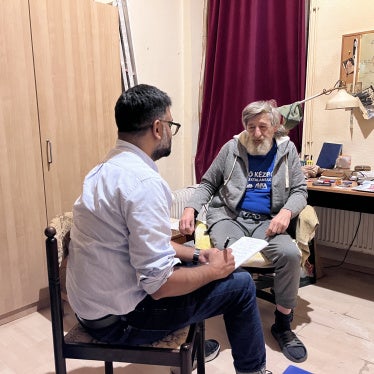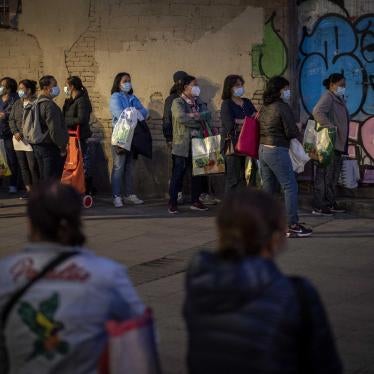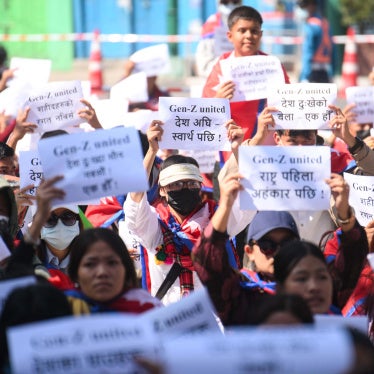Uzbekistan has made no real progress toward meeting the human rights benchmarks set by the European Bank for Reconstruction and Development in its current country strategy for Uzbekistan, Human Rights Watch said today.
In a new fact sheet, Human Rights Watch documents the Uzbek government’s increased persecution of political opposition figures and civil society activists, and the continued violent crackdown against independent Muslims in the months following the bank’s previous visit in July.
Despite the release of four human rights defenders from prison, authorities have jailed Ruslan Sharipov, an independent journalist and human rights defender, on what appear to be politically motivated charges, and brought questionable criminal charges against another two defenders. Authorities have also failed to prosecute those responsible for the abduction and severe beating of Sharipov’s legal representative, Surat Ikramov, in late August.
The Uzbek government has not allowed any independent local human rights group to register since the EBRD adopted its country strategy in March. The government says it has changed its legal definition of torture to bring it in line with the Convention against Torture, but otherwise has taken no real steps to curb it. A draft action plan, drawn up by the authorities to implement the recommendations of the United Nations special rapporteur on torture, has been widely criticized for emphasizing seminars and conferences while proposing little concrete action.
“More than halfway through the one-year deadline set by the EBRD there is virtually no change on the ground,” said Rachel Denber, acting executive director of Human Rights Watch’s Europe and Central Asia division. “This should certainly set off warning signals within the bank and its shareholder governments. They should now redouble efforts to ensure that their engagement with Uzbekistan serves to promote human rights and democracy in the country.”
The EBRD country strategy for Uzbekistan found that the country’s progress toward democracy and human rights remained “slow and characterized by setbacks,” and set three human rights benchmarks for the government to fulfill: greater political openness and freedom of the media; registration and free functioning of independent civil society groups; and implementation of the recommendations of the U.N. special rapporteur on torture following his country visit to Uzbekistan late last year. The bank gave the government a one-year deadline for compliance with these benchmarks.
The bank’s country strategy was adopted at a critical moment for the institution’s engagement with Uzbekistan, less than two months before the EBRD in May held its annual meeting in Tashkent. The bank’s decision to allow the Uzbek government, among the most repressive in the region, to host its annual meeting stirred significant controversy.
In 2002 Human Rights Watch began a campaign calling on the EBRD to use its leverage prior to the meeting to press for concrete progress in human rights. The bank instead argued that it was confident the meeting itself would serve as an incentive for reform.
The annual meeting was marred by numerous incidents of government harassment and intimidation of human rights defenders who had used the event to speak out against abuse. The bank nonetheless trumpeted the meeting as a success and afterwards has not publicly reaffirmed its demand that the Uzbek government institute reforms.
“It should be clear to everyone by now that quiet diplomacy simply doesn’t work in a country like Uzbekistan,” said Denber. “The EBRD would do better speaking out about the alarming lack of progress in human rights, and publicly calling on the Uzbek government to move forward with the necessary reforms.”
Human Rights Watch also called on concerned governments and other intergovernmental institutions to help advance the benchmarks set by the EBRD.
“Shareholder governments must make these calls an integral part of their bilateral dialogues with the Uzbek government, and use every opportunity to push for reforms,” said Denber. “Institutions such as the OSCE, the U.N. and the EU should make full use of the mechanisms available to them to drive home the message about needed reforms in Uzbekistan.”
Among those best positioned to affect change in Uzbekistan are the United States and the European Union, both of which have important levers available to them in the coming months. The U.S. State Department is about to decide whether to certify Uzbekistan as making progress in human rights, as required under the Cooperative Threat Reduction Act. The European Union is preparing to hold its Cooperation Council meeting—the single most important bilateral encounter with the Uzbek government—in January.








